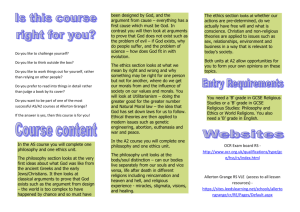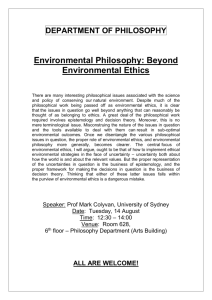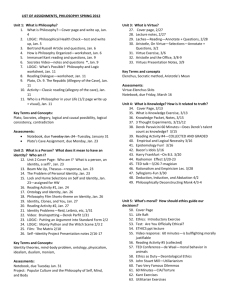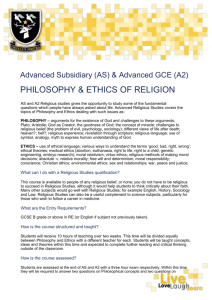Philosophy and Ethics induction information 2014
advertisement
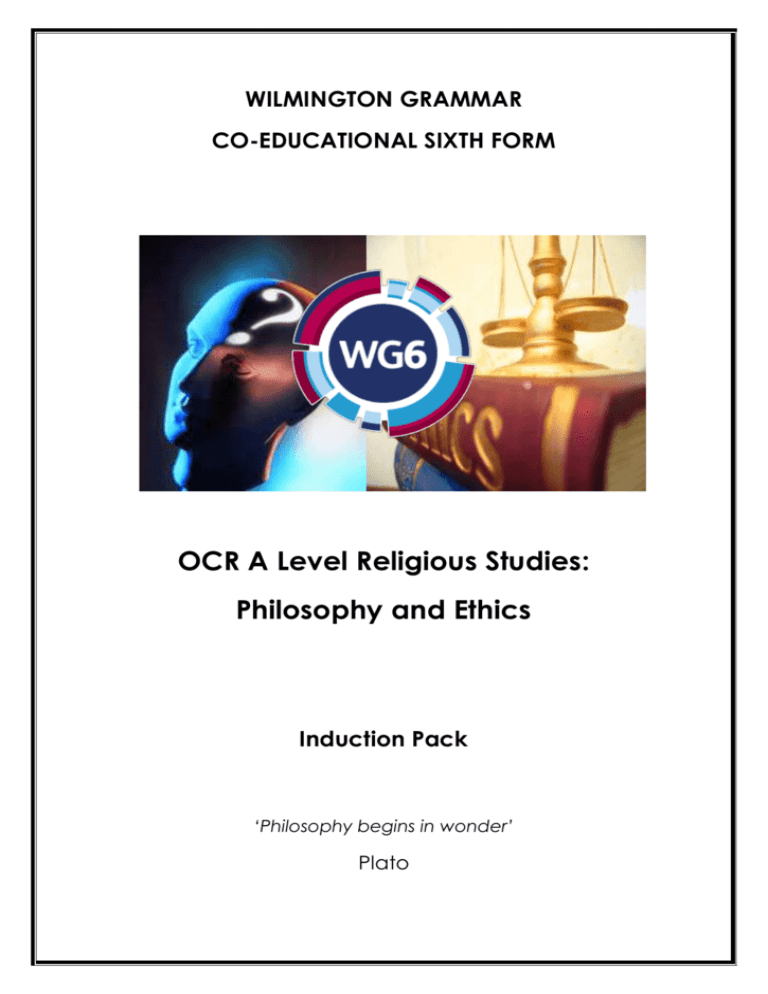
WILMINGTON GRAMMAR CO-EDUCATIONAL SIXTH FORM OCR A Level Religious Studies: Philosophy and Ethics Induction Pack ‘Philosophy begins in wonder’ Plato Introduction Have you ever wondered why we are here, what our purpose and value is then this is the subject for you. Philosophy and Ethics provides an essential component in any sound, general education in two ways – by means of the understanding it provides of various philosophical matters and by means of the general intellectual skills in logic, the use of language and the assessment of evidence it inculcates. Not only does philosophy provide an understanding of a wide range of matters, but the matters dealt with are important and exciting. Consider: Is human reason fallible? Does morality rest on arbitrary foundations? Is there such a being as a God? Philosophy and Ethics deals professionally with logic, the use of language, and the assessment of evidence. As a result, this discipline is an especially valuable training ground for the intellect. How long is the course? The full advanced level qualification is a two year course which consists of the AS and A2 courses. Who teaches the course? Philosophy: Ms Walters (HoD RE WGSB) Ethics: Mr Carter (HoD RS and Philosophy WGSG) What qualifications do I need? 5 or more GCSE’s at grade C and above with a B grade in English Language. Course structure OCR AS Philosophy of Religion G571 • • • • • Ancient Greek Influence of Philosophy: Plato and Aristotle Judaeo-Christian Influences on Philosophy of Religion Arguments for the Existence of God Problem of Evil Science and Religion OCR AS Religious Ethics G572 Absolutism and Relativism Natural Law Theory Kantian Ethics Utilitarianism Religious Ethics Ethical Issues: Abortion, Euthanasia, War and Peace and Genetic Engineering OCR A2 Philosophy of Religion G581 Religious Language Religious Experience Miracles Nature of God Life After Death OCR A2 Religious Ethics G582 Meta Ethics Free Will and Determinism Conscience Virtue Ethics Environmental, Business Ethics and Sexual Ethics. Departmental Expectations Attendance at every lesson is expected. If an absence does occur it must be agreed in advance and if an unexpected absence e.g. illness occurs, the teacher of the lesson should be emailed beforehand. Students must take responsibility for catching up missed work. Homework and Independent work will be set and will include tasks such as reading, note taking, research from relevant magazines, essays, essay plans, mock exam questions and preparing group presentations. Students are expected to be fully engaged and involved in lessons by taking notes, asking questions, participating in discussions and group tasks and to seek extra support and guidance to support and extend their learning. How will it benefit me in the future? According to The Times of London: "The great virtue of philosophy is that it teaches not what to think, but how to think. It is the study of meaning, of the principles underlying conduct, thought, and knowledge. The skills it hones are the ability to analyse, to question orthodoxies and to express things clearly. However arcane some philosophical texts may be--and not everybody can come to grips with the demands of Austrian logical positivism-- the ability to formulate questions and follow arguments is the essence of education. It can also be studied at many levels. In the US, where the number of philosophy graduates has increased by 5 percent a year during the 1990s, only a very few go on to become philosophers. Their employability, at 98.9 percent, is impressive by any standard. Philosophy has always been a good training for the law; but it is equally useful for computer scientists. In this country, the Higher Education Statistics Survey puts philosophy of science right up with medicine in its employment record for graduates. Philosophy is, in commercial jargon, the ultimate 'transferable work skill.'" Philosophy and Ethics teaches you skills of evaluation and analysis which are applicable to almost any walk of life. It is not just about what others think; it is about learning to think for yourself. According to AGCAS – the Association of Graduate Careers Advisory Service, RS/Theology graduates go into a wide range of careers. However they, and employers, feel that it particularly prepares students for the following careers: Financial services, Legal sector (Law), Medicine, Politics, Consultancy, Journalism, Education, Social care, community work. And that’s not all. The skills you will develop will benefit you in any area involving working with others showing initiative thinking for yourself…. that’s just about anything! Sixth Form Summer Induction Task Philosophy and Ethics Plato and Aristotle both aim to understand what remains constant in our ever changing world. Your task is to investigate the theories each philosopher puts forward to answer this question. You should primarily use Jostein Gaardner’s Sophie’s World In your written piece you must demonstrate your understanding of: Both theories The evidential or rational basis for the theories The significance of Plato and Aristotle and their theories on the world of Philosophy and Ethics The comparison between the theories Your response to the theories - in your opinion do Plato and Aristotle achieve their goal? Your answers need to presented in a written form, between 1 and 2 pages long. Your answers should be supported by relevant and purposeful quotes from Sophie’s World. Success Criteria: AO1: Demonstrate Knowledge and Understanding Select and demonstrate clearly relevant knowledge and understanding through the use of evidence, examples and correct language and terminology appropriate to the course. A/B: Address the question specifically and select relevant material. Deploy comprehensive and mostly accurate knowledge and use a range of technical language and terminology accurately and consistently. Then competently explain appropriate examples and/or relevant sources/scholars. AO2: Analysis, Evaluation and Application Critically evaluate and justify a point of view through the use of evidence and reasoned argument. A/B: Construct a coherent and well-organised evaluative argument, demonstrate an informed viewpoint and evidence thinking within the context of understanding different arguments and views. Use proficient, fluent and accurate language. Recommended Reading/ Useful Websites/References: OCR Philosophy of Religion for AS and A2; Routledge. Matthew Taylor OCR Religious Ethics for AS and A2; Routledge. Jill Oliphant Ethical Theory (Access To Philosophy). Mel Thompson Understanding Philosophy of Religion for AS & A2 (OCR). Ahluwahlia Understanding Religious Ethics: A Complete Guide for OCR AS and A2 Textbook. Richard Wright Ethical Studies. Robert Bowie. Nelson Thornes Philosophy of Religion for A Level: Jorden, Locker and Tate. Nelson Thornes RS Review The Puzzle of Ethics by Peter Vardy Sophie’s World by Jostein Gaarder (ISBN 1-85799-291-1) contains a brilliant overview of the history of philosophy and philosophers in a narrative format. I particularly recommend you read the chapters on: Kant, Plato, Aristotle, Hume and Descartes http://www.rsrevision.com/contents/index.htm http://plato.stanford.edu/ Frequently asked questions Q. Do I have to be religious to study Philosophy and Ethics? A. No, the course is designed to make you think for yourself. If you can think and defend your own view in an academic manner then your view is always valid. Q. What subjects is Philosophy and Ethics compatible with? A. Philosophy and Ethics is useful to study alongside any subject. It can be studied alongside the Humanities (History, English, Business Studies and Geography) or the Sciences, as the course involves analysis of the problems of genetic engineering and even creation. Q. Do I need to have studied it before? A. No, but it helps to have at least a B in GCSE Religious Studies and English to show you have developed written and evaluation skills. Many of the concepts in the A/AS course will be new to everyone. The delivery of the course is also very different to the GCSE as we have more curriculum time to debate, evaluate and explore the concepts as well as enrichment opportunities to really help you to engage in the subject.


